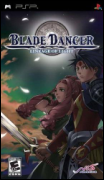Blade Dancer: Lineage of Light Review
|
|
See PixlBit's Review Policies

On 11/23/2009 at 06:08 PM by Lukasz Balicki An interesting combat and crafting system can't save this bland and generic RPG. |

Not recommended unless you are absolutely desperate for an RPG and nothing else is of interest.
Blade Dancer: Lineage of Light was originally released as a retail game in 2006 and recently came to PSN in order to celebrate the PSPgo launch. Blade Dancer is an RPG that follows the typical clichéd conventions of the genre. The only aspect that differentiates it from others is unique combat and crafting systems. Unfortunately even these unique features can't save this poor RPG.

Players assume the role of Lance, a young man who bears a distinctive red tattoo on his forehead. One night he dreams of an elven female in need of rescue, and so without any confirmation, he sets off on a journey to help the young woman. Lance heads to a mysterious land called Foo with the goal of assisting anyone asking for help in hopes that one will be the princess for his dreams. Given the clichéd and ridiculous plot, it should be no surprise that the dialog is bland and forgettable as well.
Blade Dancer is unique in the sense that it has no random battles. Instead, enemies are represented on the field by a floating skull. Players are able to lock on to that enemy to see a vague hint of what enemies are in the group. If the skull has a crimson tone, the enemies in the group are typically more powerful than regular enemies.

The combat system is one not often seen in RPGs these days, modeling the Active Time Battle gauge that was introduced in Final Fantasy IV rather unique and well done. In this system, players will see a dial that spins clockwise above each characters name, and not until it makes a complete revolution can an action be performed by that character. Like any other RPG, you have a standard set of moves including regular attacks, special abilities called Lunabilities, as well as the ability to flee, use items, and change equipment. With the exception of changing equipment, all the other actions consume a single turn.
Though mostly similar to other games in its basic construct, the game distinguishes itself with its Lunar system. Whenever one of your characters or an enemy successfully attacks and deals damage, the lunar gauge fills up with lunar points. Because both your party and the enemies have Lunabilities, the gauge is shared across both groups. When an ability is cast, the required amount of lunar points are temporarily depleted from the lunar gauge. While the ability is being cast, the character has to concentrate for a period of time in order to successfully perform the ability. If the concentration is broken due to an enemy attack, the ability fails and the lunar points are returned to the lunar pool. This creates a system where players must try to both use the gauge with their attacks while preventing the enemy from doing so. Because the moves take some time to execute, the task can be quite challenging.

In addition to this special attack system, Blade Dancer also offers a crafting system. Because weapons in the game break, it’s important for players to leverage this system. Players can craft weapons and items at anytime by learning a recipe; a roadmap to creating a given object. Learning these recipes will happen throughout the game by either talking to NPCs, paying 100 gold to an appraiser, and trial and error (attempting to craft without a recipe). Only with these methods will players permanently learn the recipe for future usage. Unfortunately, even with a recipe, crafting can fail, causing players to lose all or some of the materials used to do so.
Aside from these two unique aspects, there is little about the game that most will find of interest. Players will most likely have already played a more interesting title that bears similarity to the typical JRPG conventions of Blade Dancer.

Other than being extremely bland, the game has a flawed save system, especially for a portable game. All of the save points are few and far between, making hard for players to quickly stop playing or pick up and play the title. Furthermore, the game doesn’t even offer a save state function of any sort, forcing players to put their PSP into sleep mode, which of course drains your battery gradually.
It's hard to recommend Blade Dancer given its lack of unique and enjoyable aspects. While it does offer both the advanced combat and crafting system it’s not enough to improve the overall quality of the game.









Comments